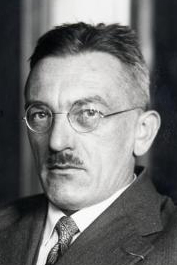Ministerialrat Dr. Karl Lugmayer

Personalia
Born:
Died:
Profession:
Persecution:
Dismissed in 1938,
Resistance fighter (undiscovered)
Memberships
Curriculum Vitae
Karl Lugmayer is born as the son of a respizienten (reporter) whose family comes from the Mühlviertel. In 1895, he became head of the secondary customs office in Schwarzenberg am Böhmerwald (Rohrbach district) on the Bavarian-Upper Austrian border. His mother was closely related to the Abbot of Kremsmünster, Augustin Resslhuber, who was also Deputy Governor of Upper Austria and a member of the House of Lords.
Karl Lugmayer attended elementary school in Schwarzenberg, then the Petrinum Episcopal Grammar School in Linz from 1903. After his father's retirement, the family moved to Linz-Urfahr, so Lugmayer transferred to the state grammar school there in 1909, from which he graduated with distinction in 1911.
Lugmayer then studied at the Faculty of Philosophy at the University of Vienna to become a teacher of Latin and French (Dr. phil. 1916 sub auspiciis imperatoris in French), where he joined the Aargau student fraternity in 1913. In order to finance his studies, he worked as an assistant stenographer in the Imperial Council and for the Central Commission of the Christian Trade Unions under Leopold Kunschak.
For health reasons, Karl Lugmayer was not called up for military service. Lugmayer also came into contact with the Reichsbund der christlichen Arbeiterjugend through his activities at the Christian Trade Union and worked there on the Education Commission. After 1918, he was appointed to the Education Advisory Board of the State Office (Ministry) for Military Affairs, where the well-known writer Robert Musil was also active.
As an employee of the Christian Trade Unions, he presented a draft program at the 10th Congress of the "Reich Association of Non-Political Workers' Associations of Christian Workers in Austria" in Linz in August 1923. In it, he professes his support for the encyclical "Rerum novarum" and democracy, among other things.
From 1924 to 1927, Karl Lugmayer studied part-time at the Faculty of Law and Political Science at the University of Vienna. From 1925 to 1935, he also worked part-time as editor of the periodical "Neue Ordnung" published by the Reichsverband. During this period, he can be described as the theoretician and programmatic ideologue of the Christian workers' movement. In this capacity, he gave numerous lectures and published widely. However, these full-time and part-time activities took their toll on his health. He was also a member of the "Study Group of Catholic Sociologists" founded by Anton Orel in 1929.
In 1934, Karl Lugmayer became Vienna's head of public education. He subsequently became head of the City of Vienna's Department of Public Education in 1936. In this role, he also established a Jewish adult education center. He himself had a rather distanced relationship with the "corporative state" because it did not correspond to his ideas on social theory. Nevertheless, he was a member of the Federal Cultural Council from November 1, 1934 to March 12, 1938 and was initially actively involved in the "Social Working Group" of the Fatherland Front (VF). He also had contacts with Viktor Matejka, who was on the left wing of the VF and became a KPÖ city councillor in Vienna after 1945.
After the Anschluss, Karl Lugmayer was removed from his position as head of the People's Education Office on March 28, 1938 and dismissed on March 30, 1939 through forced retirement. He was monitored by the Gestapo, who also confiscated his works. Together with his parents, he lived in seclusion in Vienna-Ottakring (Starchant estate) during the war, engaged in various studies (including philosophy and Russian) and also attended lectures at the University of Natural Resources and Life Sciences.
As the war progressed, Karl Lugmayer was active in the resistance circle around Lois Weinberger, which also included Felix Hurdes and Karl Kummer, working on the illegal re-establishment of the Christian workers' movement. Based on these considerations, the Austrian Workers' and Employees' Federation (ÖAAB) was founded in Laudongasse on April 14, 1945, with Leopold Kunschak as its president.
On April 27, 1945, Karl Lugmayer was appointed Undersecretary of State (as we understand it today) in the State Office (Ministry) for Public Enlightenment, Education and Cultural Affairs under the leadership of the Communist Ernst Fischer in the provisional state government of Karl Renner. He held this position until December 20, 1945, where he was able to save religious instruction right from the start, from which students could opt out but did not have to enrol. During this time, he introduces fermentation technology, now called biotechnology, at the University of Natural Resources and Life Sciences.
From December 19, 1945 to December 11, 1959, Karl Lugmayer is a member of the Federal Council delegated by the Vienna State Parliament, of which he is the permanent deputy chairman from July 1, 1951 to December 31, 1956. Professionally, he was again assigned to the Ministry of Education.
Places
Residence:
Citations
Biolex des ÖCV unter www.oecv.at/biolex; Stand: 02.10.2022.
